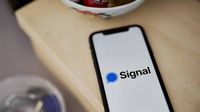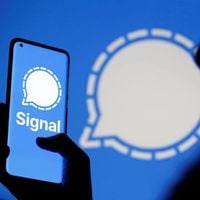As concerns over privacy intensify in the digital age, the Signal messaging application has emerged as a strong contender in the secure encryption race. This comes after its CEO, Meredith Whittaker, labeled the app as the "gold standard for private communications" following a scandal involving sensitive information being leaked from the White House through a group chat on the platform.
Whittaker emphasized that Signal provides the highest privacy standards, a statement made in the wake of criticism regarding the security of encrypted platforms after officials inadvertently shared confidential information via the app. This incident has raised political eyebrows and led to skepticism about the safety of using such platforms for sensitive discussions.
Despite Signal's reputation for offering superior privacy compared to other messaging services, questions remain about its suitability for sharing highly sensitive governmental or military information. Jeffrey Goldberg, editor of The Atlantic, revealed on March 24, 2025, that he was added to a group chat with members of former President Donald Trump's administration discussing military strikes in Yemen, raising concerns about the app's security for sensitive exchanges.
Matthew Metelstiedt, a technology policy researcher at the Cato Institute, noted that while Signal messages may be secure during transmission between devices, once they reach the recipient, the security could be compromised. Nevertheless, if used correctly, Signal can provide multiple layers of protection to prevent conversations from falling into the wrong hands, as reported by CNN.
What sets Signal apart from competitors like WhatsApp and iMessage is its nonprofit management structure under the Signal Technology Foundation, as opposed to being run by profit-seeking tech giants like Meta or Apple. The app offers features similar to those of other messaging platforms, such as one-on-one and group messaging, voice calls, and disappearing "stories." However, it stands out by being ad-free and tracker-free, allowing users to set messages to self-destruct after a specified period.
All communications on Signal, including stories and user profiles, are encrypted by default, meaning data remains encrypted during transmission and can only be decrypted by the sender and recipient. According to the app's privacy policy, Signal cannot access the content of messages or calls, nor can it identify users or their profile pictures. Eva Galperin, director of cybersecurity at the Electronic Frontier Foundation, stated, "If Signal receives a court order, it cannot deliver any data that identifies users." This feature highlights Signal's commitment to user privacy.
Signal stores chat logs only on users' devices, not on its servers, although it temporarily retains messages in queues for delivery when devices return online. The app also includes a "safety number" feature, which is a code that helps users verify the identity of their contacts. While some features, like end-to-end encryption, are becoming common in other apps, Signal uniquely combines these elements to enhance privacy.
The application is available for free on both the App Store and Google Play, requiring a phone number to create an account. However, it allows users to hide their number when communicating with others. To initiate a new conversation, users can click on the message icon and search for contacts using their phone numbers or usernames.
It is important to note that chat histories do not automatically transfer to new devices; they must be manually moved from the old device. The app also provides advanced privacy management options, such as hiding content when switching between apps and setting timers for message disappearance. However, users should be aware that messages sent can still be seen by the recipient unless deleted before they read them.
In light of the recent events, the popularity of Signal has surged. Data from Sensor Tower indicates that downloads of Signal in the U.S. jumped by 16% in the first quarter of 2025 compared to the previous quarter, and by 25% compared to the same period in 2024. Whittaker attributes this growth to the app's absolute transparency in its policies, its lack of metadata storage, and its security guarantees that surpass those of other platforms, even though they utilize the same technology.
While WhatsApp remains the most widely used messaging app globally, Signal is rapidly gaining traction as an ideal choice for those concerned with maximum privacy, especially in light of rising security fears and political leaks. The app has even seen a staggering 958% increase in downloads in the Netherlands over a two-month period, further solidifying its position in the market.
As users navigate the complexities of digital communication, the choice of messaging platform becomes increasingly crucial. Signal's commitment to privacy and security, coupled with its unique nonprofit structure, makes it a compelling option for journalists, activists, and anyone looking to keep their communications confidential.
However, users must remember that the effectiveness of Signal—or any secure messaging app—largely depends on how they use it. While Signal offers robust protection, the potential for breaches exists, particularly if the devices used to access the app are compromised. As such, adopting best practices for digital security is essential for anyone relying on Signal for sensitive communications.
In a world where privacy is constantly under threat, Signal stands out as a beacon of hope for secure communication. As the app continues to evolve and adapt to the needs of its users, it remains to be seen how it will navigate the challenges posed by both technological advancements and the growing demand for privacy in an increasingly connected world.



